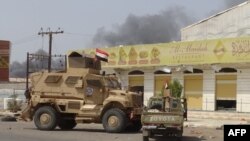Amnesty International is calling on the pro-Iranian Houthi group to withdraw from the May 22 national hospital in Yemen's Red Sea port city of Hodeida. The Saudi-led coalition, which is gaining ground in the rebel-held city, claims the Houthis are using patients as human shields.
The head of Amnesty International's Middle East program, Samah Hadad, said the presence of Houthi forces on the rooftop of the building constitutes a breach of the human rights of the patients inside the hospital.
Both the Houthis and the Saudi-led coalition trying to dislodge them from Hodeida are claiming to have inflicted heavy casualties on each other. but the head of the Houthi group, Abdel Malek al-Houthi, admitted his forces had suffered some setbacks.
He conceded that Saudi-led forces have mounted a major operation, bringing in large numbers of reinforcements and weaponry to put pressure on the city and advance. But he added that the major part of Hodeida province remains under Houthi control.
A Yemeni military commander working alongside Saudi-coalition forces said coalition forces have advanced in Hodeida and that the Houthi forces have been fleeing and taking heavy losses.
VOA could not independently confirm these reports. Recent Arab media video showed coalition forces advancing inside the city.
Mohammed al Bakhiti, a Houthi spokesman, told Arab media his group was inflicting heavy casualties on the Saudi-led coalition.
He said Saudi-led forces attack from the air, then bring forces in to advance inside on the ground. But he claimed his men lure them into narrow areas, then inflict heavy casualties on them.
Meanwhile, many international NGOs and humanitarian groups like the U.N.'s FAO warn of the increased risk of famine in Yemen if fighting continues.
The group's head, Jose Graziano da Silva, said on Twitter fighting is making the situation worse.
Despite various appeals to end the three-and-a-half-year-old conflict, Samir al-Shibani, the deputy-human rights minister of Yemen's internationally recognized government of President Abdrabbu Mansour Hadi, claimed these appeals increase whenever the Saudi-led coalition advances in the country.
He contended that the internationally-prompted hysteria to hold dialogue begins every time the balance of forces on the ground begins to tip in favor of the Hadi government. Despite the noise, he said the Hadi government's conditions are for dialogue are well-known, the main condition being that all traces of the Houthi-led coup on the ground be removed.
U.N. Yemen envoy Martin Griffiths told Al Hurra TV several days ago he was hoping to bring the parties to the dialogue table "before year's end." He said "a number of European governments have offered to host the talks.
Recent efforts to bring representatives of the Houthis and the Hadi government to the bargaining table have failed.










